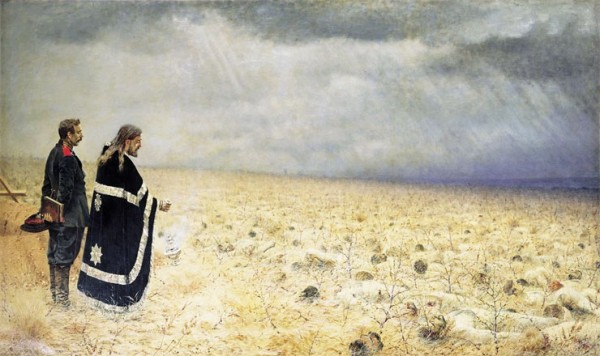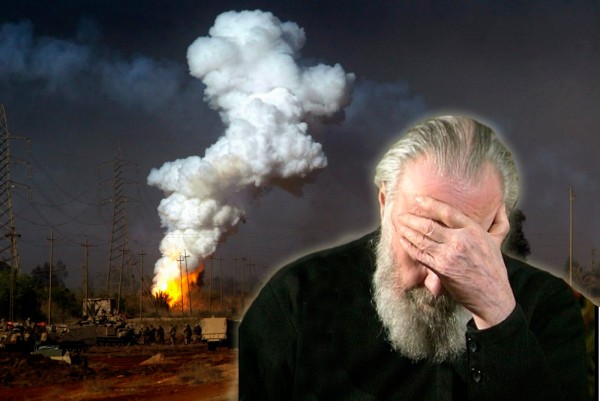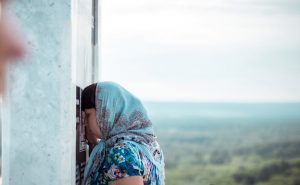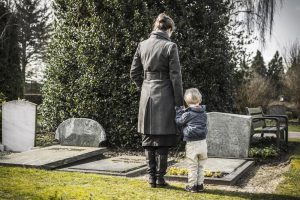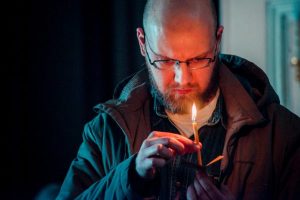When I was a young medical student, I was told that health is a very precarious condition that always ends in illness. Well, illness if it does not end in death, is full of hope because it will lead to recovery, andthat health is not something one can possess with security, it is something one must fight for all the time, it’s to be conquered and to be sustained maintained. And I think to a certain extent one can say a similar thing about peace. Peace is not a condition, which is at state of stability. It is not something which we can possess without protecting it, without making it ever stronger. And it does not begin at the moment, this warfare in favour of peace does not begin at moments when there is a political tension between countries or when a war is brooding. It begins within ourselves first and foremost. And I want to say something about this aspect of peace because without it I don’t think one can understand an Orthodox attitude to peace, to war and to the general warfare which the spiritual life represents.
Within us there are tensions, there is a lack of harmony, which is born from the fact that we are not rooted in God perfectly or sufficiently. In terms of imagery one could say that God is the key of harmony which could make a score readable, which could give it a structure. When the key doesn’t exist, one can not read the score, one can not understand what is written. And the same is true about human relationships. You probably remember the passage in the Prophet who says, “They say, peace, peace, and peace shall not be given to them.” Because there is no way of building peace on the advantages of it or the fears, which the lack of peace can evoke. Peace begins first of all in our rootedness in God.
You remember again the greetings of the angels on Christmas night, “Glory be to God on high, and on earth peace, and goodwill among men.” This is the hierarchy of things. Short of this no peace can survive because otherwise it is built only on fear, on cowardice or on advantages one can gain from it or not, but the moment one begins to think of advantages, there is a clash of desires, of hopes, of needs. So that from an Orthodox point of view whenever we think in terms of peace, the first question of which we ask ourselves is, where do I stand with regard to my own peace of mind and heart, how do I relate first of all to God, is He the Lord, have I enthroned Him in my mind, in my heart? Is His will my will?.. I do not mean to say that the two wills are identical or in complete harmony because mine is too immature, too wavering for this, but do I intend with all my determination that His will be done and not mine? Have I enthroned God in my relationships? Is He the one who rules my life, who stands between me and whoever else is in my presence or in whose presence I am?
You remember this passage in the Book of Job where in his agony he says, “Where is the man who will take his stand between my Judge and me?” And the Septuagint version says, “Who will put his hands on my shoulder and my judge’s shoulder,” the gesture is that of Crucifixion and the image that of Christ. Centuries before the Incarnation Job felt that someone must come who will be the equal both of God and man, capable of standing at the heart of the conflict, capable of bringing together the two conflicting parties, equal in a position to put his hand on both shoulders without crushing the one and without sacrilege with regard to the other. So that’s where things begin to shape in terms of Christian peace: to be related to the one who is the Prince of peace, the one who is our reconciliation with the Father, the one who brings together heaven and earth, the one, and that is important if we think in terms of peace, who was prepared to make the conflict between the two extremes – God and man – an internal conflict,be God and be man and resolve the conflict within himself before the harmony could spread afterwards.
So it is to Christ that we must turn, enthrone Him and become His disciples. You may well say that it’s not something to be done, it is already done, aren’t we His disciples? Yes, and no, in intension – yes, but in actual fact, are we? When Moses came down from Sinai, people looked at his face and could not endure the radiance of it because he had been face to face with the glory of God. Is there anyone of us who could claim or hope that people who meet him in life will feel that there is a radiance on his face, a light in his eyes which is of God? Are we a challenge to everyone whom we meet not by the words, which we preach, but by the revelation of the power of God, the holiness of God, the radiance of God just in what we are before we have spoken, before we have acted, simply by meeting. And I was quoting by someone earlier a phrase from a war broadcast by C.S. Lewis in which he says that the difference between a Christian and an unbeliever should be as great as that which exists between a statue and a living man, and the message of Christianity should be: look, statues have come to life! People should look at us and see that we are alive – not simply biologically, not simply as remarkable or less remarkable samples of the human species but as people whose mother country is Heaven, whose city is the New Jerusalem, who are, to use a translation of an Epistle by Moffatt, a vanguard of the Kingdom, an army but an army that is conquering the earth in ways in which no earthly army does, by giving its own life, not by taking, by giving a dimension of eternity to everyone of the creatures of God, not by overpowering them and forcing them into perhaps a harmony, but a harmony which is too small for the vastness of the human spirit. So that is where it begins – the Kingdom within us spreading because it is within us, the way in which again the Gospel speaks to us and says, “One does not light a candle to put it under the bushel or under a bed. It is put on the candlestick that it may shine. Let your good deeds so shine before all men that seeing your good deeds they give glory to your Father who is in Heaven.”
So that is, perhaps, it seems to be very far from the subject, but it is not far from the subject in the sense that if there is no harmony within us, we can not be a source of harmony. There is no point in speaking of peace if there is no peace within us. And peace within us begins with a basic, absolute thing – whether we are at peace with God. That implies peace with our own conscience. It means that the dividedness there is between our mind and our heart, the waverings of our will are stilled, but not simply stilled and made harmonious within the limits of the possible, — beyond the limits of the possible, on the scale of God, not on the scale of what we can achieve by experience and sagacity and cleverness and compromise an so on.
And then we are faced with the causes of our dividedness from God within ourselves and from our neighbour and ultimately when we look at it, we may well find that the causes are greed, fear and hatred, in that order. Greed which is born of the fact of an illusionary self-sufficiency and the desire to possess, to make mine all that can gratify my desire, to make mine all that can enhance my personality, my comfort, my safety. Greed to possess not only material goods, not only intellectual goods, but even spiritual goods, to possess God as one can have an object, to possess the truth as though it was something one can appropriate to oneself. Greed always leads to a feeling that what we are attempting at possessing can escape us and what we do possess can be taken away from us, and it leads to fear, not to the fear of God, to the fear of our neighbour, because it is the neighbour who is the danger. And the moment we fear our neighbour, we set ourselves up against him in terms of suspicion, in terms of alienation, in terms of aggression. And then the warfare begins, not perhaps between nations, it may begin within a family between husband and wife, it may begin between children and parents, it can begin at work between the various strata of an institution. It may begin on any level and spread at every level. And unless we are man at peace in a deeper and more essential sense, we cannot be men of peace ad extra, we cannot create peace around us if there is no peace within us because we can not share the peace which we do not possess.
Now, this results in all the difficulties, which we have got both in our families and outside of it, it results in this struggle, which is continuous between human beings. And the answer is in Christ’s words “Whoever wishes to follow Me, let him renounce himself.” Now, the word “renounce” is a difficult word. If you turn to the Greek text, it means “turn away from”. We are all the time living in a self-centred manner. We stand between us and all the world around us. Our desires, our hopes, our fears are like a screen between us and the surrounding world. And what Christ says is, “Look out, look round, whenever your own person begins to stand between you and another person, between you and God, between you and things greater than you, between you and the beauty of the world, just say, ‘Get out of my way, you are blocking my way, you are a bore.’”
You know what happens when we are left to our own devices. When, say, in a retreat we have got to spend one to three days silently with no-one but own selves how desperately bored we begin to be. It could teach us something very useful, could explain why others so bored when they are with us, but it is that. We stand in our own way, and the first thing is to say, “I am not interested in this person, there are so many more interesting things. There is beauty, there is truth, there is love.” So that our struggle for inner peace begins inside of us by becoming free from our own selves and looking outward. And the moment we look outward, we realise that greed, fear, hatred have no place in building either a family or a society, or a nation, or a commonwealth of nations. They are destructive of it and moreover that even if we could build a world completely harmonious by working out very clever compromises so that no-one is hurt, everyone is sufficiently satisfied, it still would not be either the peace or the dimensions of a world worthy of men because the city of men, which we are called to build, the city which is the New Jerusalem, must be so deep and so vast, and so holy that its first citizen could be Jesus Christ, the Son of man but also the Son of God. Nothing smaller than this.
Now, if we have got that kind of ideal of a city to build, of a peace which is God’s own peace, of a scale of things which are this God’s scale, then we must realise that it will not be achieved by a regular, simple progress from worse to better and from better to even better, there must be a jerk, it must be something different but at the same time it will clash with others because when I spoke of greed, fear and hatred, I was thinking of myself but it applies also to my neighbour. If I resolve within myself these problems, it still remains that my neighbour may have them. The Lord said in the Gospel, “I have not brought peace, I have brought the sword,” not the kind of sword of which He said, “Whoever uses the sword will die by the sword,” but the sword as described by St. Paul, the sword of truth, the sword of the divine word that divides between light and darkness, divides so deeply that it separates bones and joints, a sort of laser beam that ruthlessly and wonderfully divides and separates what should be divided, should be separated, and it is our function as Christians to acquire discernment, to become capable of assessing what is right and what is wrong, what is true and what is false, what is of God and what is of Satan, what is destructive and what is constructive.
Very often one hears people say that we are called not to judge. and as a result they abstain from assessment. We are not called to confusion, we are not called to be incapable of discerning between what is right and what wrong, we are called to assess it very precisely, to assess it in the light of God, which is cruder, sharper than any light of human mind. What we are called not to do is not to confuse the evil-doer with the evil deed, to identify the one with the other as though there was in the person who is our opposite number nothing but evil.
The French writer Sartre says in one of his plays, I think, “Judas is not a traitor because he betrayed Christ, he betrayed Christ because he was a traitor.” No, you cannot say that there was nothing even in Judas but the traitor, and even less can we say about anyone, anyone without exception that there is nothing good in a person and that he can be summed up in the action which we condemn. One of the characters of Dostoevsky says, “Don’t say that this men were evil, it was good men but they acted so badly.” And it is true because that is the way in which we assess ourselves. When we have done something quite reprehensible or ugly, we do not rule ourselves out as being simply evil, we say, “A, I have done wrong.” Yes, and we can discern the wrong and the right because there is right and wrong in us or around us.
And then come major clashes and major problems because the greed, the fears, the agonies of others and our own clash – what can we do about it? Russians, I am afraid, are not sentimental about things like life, death, war and peace, and I don’t think that we find much, sort of, strict peace-movement mentality among Russians because the history of Russia has been so tragic, so full of pain and of death, and of blood that there was no moment when things were simple enough, peaceful enough on the surface for us to say, yes, let us just accept things and they will come right.
Now, if what I said before about our inner condition is at all right, then we may understand what St. Basil the Great says in one of his letters. He was asked by a correspondent what he thought should be the role or the position of a Christian in case of war, and his answer was so interesting. It has never been applied, I am afraid, but it remains a guide-line I think to thinking. He says, if the Christians of the given country had been true Christians, men of perfect sacrificial love, there would have been neither hatred, nor conflict. If there is a conflict, they must recognise that they were unable to be a revelation of Christ’s Gospel, and in that case they can not entrench themselves against the words of Christ, “Do not kill,” or preach non-resistance to evil because they should have done it earlier than when the conflict occurs. And his conclusion is that a Christian should in case of war take part in the conflict, which he was not capable of avoiding, of preventing, but as he recognise himself as a sinner, a culprit in the situation, he should be excommunicated for the whole period of war and for three years later. It never was applied but it is a point of view, which we cannot simply ignore because it faces us with our own responsibility in the societies in which we live, whether it is an armed conflict, whether it is strike, whether it is competition for a better position, it is always the same problem — where do we stand in these terms of peace within ourselves.
Now, I want to say just a few more things and I think I should be personal about them, and I wish you not to charge the Orthodox Church with what I will say now. I feel very awkward about peace at all cost, because there are things, which are more important than peace, more important than human life. I do believe in honour and I do believe in right. I have been five years in the last War and I am in no delusion as to what the war represents, and I still feel that it was right to fight the last War because it was a confrontation with something that was evil.
I met once a young man, the only one in my life who was what I would call a truly consequent man of peace. I took a retreat for Oxford students and after my first address a young man came up to me and said, “Bishop Anthony, I am leaving your retreat because you are not a Christian.” So I said, “Well, do, but I have a right to be helped to become one. Could you tell me in what way I am not a Christian?” He said, “No, you are not a pacifist.” So I said, “You are one?” “Yes.” “Could you answer me the following question: you walk into this room and you find a ruffian about to rape your girlfriend. What will you do?” “I will address myself to him and try to convince him not to do it.” “And suppose that he pays no attention and proceeds, what will you do?” “I will kneel down and pray the Lord to prevent it.” “And supposing in spite of your discourse and your prayers it happens, and the ruffian walks out of the room with the smile on his face, what do you do?” “Then I’ll pray the Lord Who brought light out of darkness to bring good out of evil.” Well, I haven’t got the English ability to put things in a mild manner and I said to him, “Well, you can go away from the retreat but I can tell you that if I was your girlfriend, I would look for another boyfriend.”
And I think that is not just a funny anecdote. Unless you are prepared to go that length, day in and day out, it is too late to choose for peace without condition when things become a little too sharp and too hot. I know the commandments of Christ concerning ‘thou shalt not kill’, I know all one says now about the sanctity of human life, but put it into context. The same Christ or the Old Testament tell us, ‘thou shalt not steal’, ‘thou shalt not commit adultery’, ‘thou shalt not do this and that’, ‘thou shalt not covet your neighbours ass’. Where do we stand with this? Why do we single it out one commandment while we transgress quite happily the other ones? We speak of the sanctity of human life and quite often people say, how can I take part in an armed conflict and kill? In the same breath the same people will argue in favour of abortion which is murder, simple. You may say:t it’s something which is worth doing, may be, but it is all the same a murder, the murder of the defenceless and of the innocent while the war brings to risk other people, but it’s not a cold-blooded murder, it’s a tragic murder. I remember as I was going into the war I asked an older man about his experience of the First World War and his answer was, “When I went into the war, I was horrified at the thought that we all were about to become murderers and I realised that we all were becoming martyrs, we were going into it to give our lives to save other people, not to kill.” Obviously people can have different attitudes but that depends on the person, not on the event. One can go into the war in order to kill, well, the French Marseillaise puts it very clearly, “Forward, forward, let the impure blood of the enemy soak our fields.” But there is a military song in old Russia, that said, “We shall daringly go into battle and shed our blood for those who need our protection.” This depends on who you are and how you treat the event, and also on your scale of values.
What impresses me at present in the discussions about war and peace, about conflict and the way in which one resolves it, what impresses me is the fact that it is very often horror before the consequences of the conflict much more than simple compassion for the victims of it that motivates people, and also an attitude, which I do not find Christian towards life and towards death. St. Paul was quite clear when he said, for him to die is a gain because by dying he will meet Christ. He says in another passage that for him to die is not to divest himself of temporary life but put on life eternal. Christ had said clearly, no-one has greater love than he who gives his life for his neighbour. It’s not so much the action than our attitude to it that is decisive, and it is only face to face with ultimate challenges and the ultimate of ultimate challenges is death, that we can be sure that our convictions are strong and that we are wholehearted in our attitude. The French writer Rabelais said once to a friend, “I am prepared to stand for my convictions up to hanging, exclusively.” The moment you add the word “exclusively”, you don’t stand for your convictions. You will stand for them as long as there is no danger. It is only if we are prepared to face the ultimate, that we can say, yes, it is my conviction. And there are situations in which the only way of facing evil is to put oneself between the victim and the act of brutality.
I remember a woman called Margaret Mead who was an anthropologist, an American who said, “In certain cases all you can do is to put your body between the blow and the other person’s body.” And that is true. If we are prepared to go all the way by giving ourselves, lending ourselves to suffering and to death if necessary, then we can face challenges, ultimate ones.
I would like to end with an example of someone who did not die and did not kill but who is an example of the way in which one can give one’s life. I met a few years ago in Russia a priest of my age. He had spent 36 years of his life in prisons and concentration camps. He sat opposite me with eyes shining with wonder and said, “Do you realise, can you understand how unutterably good God has been to me? Soviet authorities did not allow a priest either into a prison or into a concentration camp and He chose me, a young inexperienced priest, and put me first for five years into a prison and then for 31 years into a concentration camp to minister to the people who needed it most.” This is as good as shedding one’s physical blood because we shed our physical blood almost by accident, we do not do it on purpose, we are hit.
And I remember (to end) a contemporary of mine also who is very tall and very broad, and he always felt rather awkward in civilian life. I remember his standing once in the underground towering over a little boy who looked at him like this and said, “Aren’t you bored all alone up there?” Well, he wrote to me a letter during the War in which he said, “I always complained at being so tall and broad, I thank God for it now because when there is a shooting at us, at least two man can hide behind my back.” Well, here is a man who was in the war, and who was giving his life, he was prepared also to fight because there is a point at which you cannot avoid fighting but that was his attitude.
Well, I think, I will end here, I am sure that…












